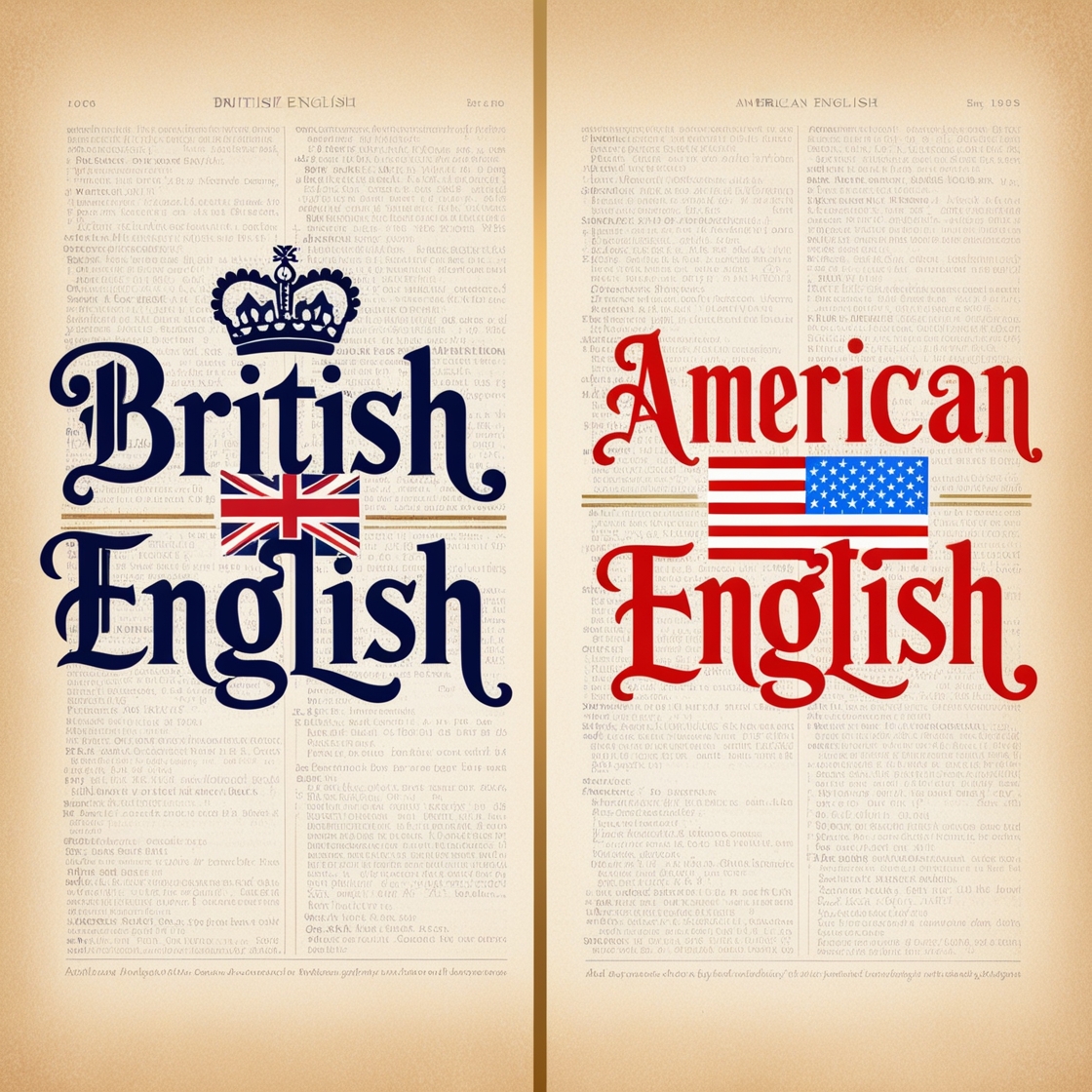“Two countries separated by the same language.” This is what they say when comparing American and British English. It’s true! While both versions share roots, they’ve branched out in different directions along the way.
Take spelling, for instance.
You’ll notice “color” in American English turns into “colour” in British English. And what about vocabulary? In the U.S., you’ll grab a “cookie,” but in the U.K., you might munch on a “biscuit.” It’s all about that local flavor.
Then there are the phrases. Americans might say, “I’ll give you a call,” while Brits might say, “I’ll give you a bell.” Same idea, but with a twist!
Punctuation also has its own set of rules. For example, the use of quotation marks can differ; Americans prefer double quotes, while Brits often use singles.
Interesting?
Let’s jump in!
Historical Origins
The history dates back to the Middle Ages. UK residents employed a Germanic language combination of Latin and French (the basis of current English).
Grammar and spelling weren’t standardized, hence words with the same Latin origin can be spelled the French or Latin way.
Samuel Johnson’s Dictionary of the English Language, published in 1755, played a big role in creating standard English spelling. He often chose spellings based on a word’s Latin or Greek roots, which sometimes matched French spellings, showing the impact of French on English words.
Noah Webster, a dictionary publisher in 1828, mostly went for spellings in terms of pronunciation and common usage rather than history, creating the course American spellings use.
Key Areas of Difference
Let’s explore some of the key areas where these variations are most noticeable, starting with vocabulary and usage.
Vocabulary and Usage
When differentiating between British and American English, three main areas stand out: transportation, food, and clothing. Each region uses distinct terms for everyday items, which can sometimes lead to confusion.
Transportation Terms:
- American English: truck, subway, elevator
- British English: lorry, underground, lift
For example, if you’re in the U.S. and you ask for a truck, you might confuse someone in the U.K. who would refer to it as a lorry.
Similarly, what Americans call the subway is referred to as the underground in British English.
Food Terms:
- American English: fries, eggplant, cookies
- British English: chips, aubergine, biscuits
When ordering food, it’s essential to know these differences. If you’re craving fries in the U.S., you’ll enjoy them as “chips” in the U.K. The eggplant, meanwhile, takes on the name aubergine across the pond.
And let’s not forget cookies versus biscuits; they may look similar, but their texture and taste can be quite different.
Clothing Terms:
- American English: sweater, pants, sneakers
- British English: jumper, trousers, trainers
If you’re shopping in a British store, asking for a sweater will lead to a bit of confusion, as they’ll refer to it as a jumper. Likewise, while Americans wear sneakers, British people wear trainers.
These differences highlight how regional language can impact everyday conversations.
Spelling Differences
Spelling differences between British and American English are simple, often following specific patterns. For instance, words that end in -or in American English typically change to -our in British English.
A classic example is the word “color,” which is spelled “colour” in British English.
Here’s a quick table to illustrate more common spelling differences:
| American English | British English |
| theater | theatre |
| flavor | flavour |
| center | centre |
| honor | honour |
| analyze | analyse |
While these differences may seem minor, they can impact how your writing is perceived, especially in formal contexts. Therefore, keep reading to know more.
Spelling Rules Exemption
It would cease to be English if it lacked spelling variations that don’t abide by any established rule.
For example, some words may appear in both variants with different meanings. The word “biscuit” is a good example. In the U.K., it refers to a sweet baked good, whereas in the U.S., it often describes a soft bread roll served with meals.
Grammar Dissimilarities
Moving on, if you think it’s all about spelling, you are mistaken. Some differences stem from punctuation and grammatical usage.
American vs British English: Where Do We Place Those Quotation Marks?
In American English, commas and periods always go inside quotation marks, while semicolons and colons are placed outside.
Dashes, question marks, ellipses, and exclamation points can be inside or outside, depending on whether they are part of the quoted material.
For example:
- American English: “Let’s meet at 3 p.m.,” he said.
- American English: He answered, “Maybe”; however, he wasn’t certain.
In British English, semicolons and colons are also placed outside quotation marks, and all other punctuation marks generally go outside unless they belong specifically to the quoted material.
In dialogue, however, British English often places commas and periods within the quotation marks to create a more fluid reading experience. Here’s an example:
- British English: ‘We’ll meet at 3 p.m.’
- British English: She said, ‘Let’s go’; he agreed.
For questions or exclamations, both styles follow similar rules based on whether the punctuation applies to the entire sentence or just the quote itself:
- American English: Did she really say, “I won’t go”?
- British English: Did she really say, ‘I won’t go’?
Understanding these differences can be important, especially for writers aiming for consistency in British or American English standards.
Learning to Write British English—or Contrariwise
If you are oriented to write as if you are that specific nationality, below are five of the best tips used for learning how to write American or British English
➡ Go Through the Format You Wish to Write
The best tools editors and writers have are their minds—and plenty of practice. Keep in mind that is how most of us learn English. Get hold of magazines, books, and news from recognizable institutions in your preferred variant.
Choose a line of subjects and concentrate more on them and the variations will naturally show up.
➡ Avoid Inconsistency
When writing, please note that choosing one usage/spelling and stick to it. If you say “theatre” then ensure that you say the same all through.
Reader-editor liking is not the same but inconsistency always appears unprofessional.
➡ Utilize Fully Your Spellcheck
Let’s say you want to write a dialect that you’re not familiar with, make spellcheck your best friend. Double-check that particular language mostly when you’re writing American English intended for British English as you will lack conclusion.
Keep in mind that this applies to autocorrect settings for most cloud documents and communication platforms.
If your writing tool lacks an internal spellcheck, use an ad extension such as Grammarly as many spellcheck programs permit you to add it directly to the software’s directories manually once and for all.
➡ Just Research It
If you doubt anything, don’t guess it, instead do some research. Editing appears easy but it’s more than knowing the right thing. It details anticipating what could be wrong. After learning a new vocabulary, incorporate it into your sheet.
Pick a specific dictionary to be used as a reference and maintain it since some dictionaries vary. Check them with repetition every time as the decisions are second nature.
Here’s a quick comparison to help you see how words might differ based on the chosen variant:
- British English: “The lorry was parked outside the garage.”
- American English: “The truck was parked outside the garage.”
This simple switch in vocabulary can make a big difference in conveying the right tone.
➡ Consult a Genuine Speaker
We at least know someone who is living or grew up in a specific country. If you’re lucky to have a pal who happens to be an original speaker of that specific variant of English you want to use make sure you consult him on how to navigate it.
One employing a dialect their whole life is the best resource. Feel free to employ forums like StackExchange and Reddit to see the variant you find most suitable.
Want to Improve Your Writing? Let’s Work Together!
British and American English have their own unique styles, and learning to write in each can seem tricky. But with the right guidance, it’s easier.
At Browrd, we’re here to help. We provide content writing and SEO services to make sure your writing sounds natural, reaches your audience, and helps boost your online presence.
Interested in making your content stand out? Contact us today to see how we can help you refine your writing, develop your brand’s voice, and attract more readers.

